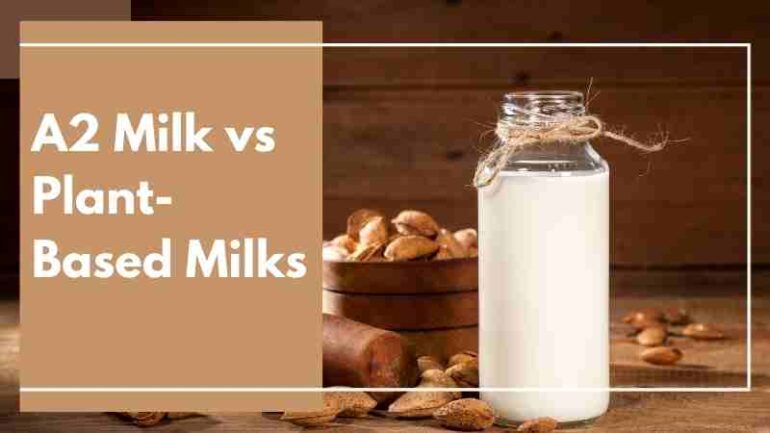Struggling with bloating, gas, or tummy trouble after your morning milk?
You’re not alone. Many people are ditching regular dairy in search of gentler alternatives. That’s why there’s a rising battle in fridges everywhere: A2 milk vs plant-based milks like almond, oat, and soy.
But which one is truly better for digestion?
Let’s break it down.
What is A2 milk, and why is it different?
Regular cow’s milk contains two types of beta-casein proteins: A1 and A2. For many people, A1 protein is the culprit behind bloating, cramps, or discomfort — even if they’re not lactose intolerant.
A2 milk comes from special cows (like Guernsey or Jersey) that produce only the A2 protein — which is thought to be easier on the gut. Importantly:
- It’s still real dairy — not plant-based
- It contains lactose, but many find it gentler than A1 milk
- It’s not a lactose-free milk, but can feel like it
So it offers a solution for those who react to dairy but aren’t truly lactose intolerant.
The plant-based contenders: Almond, Oat, and Soy milk
Each of these non-dairy milks comes with its own digestive pros and cons. Let’s unpack them.
Almond milk: Light but low on nutrients
Pros:
- Naturally lactose-free and A1-free
- Low in calories and fat
- Easy to digest for most people
Cons:
- Often low in protein (1g per cup, vs 8g in dairy)
- Commercial versions may contain gums or stabilisers that can upset sensitive stomachs
- Not suitable for those with nut allergies
Verdict: Great for light smoothies or cereals, but not ideal for protein needs or people with nut sensitivities.
Oat milk: Creamy, but watch the additives
Pros:
- Naturally dairy-free and lactose-free
- Contains soluble fibre (beta-glucan), which can support gut health
- Often better tolerated than nut-based milks
Cons:
- Some brands add sugar, oils, or gums, which may cause gas or bloating
- Higher in carbs than other alternatives
- May spike blood sugar in sensitive individuals
Verdict: A good option if you want dairy-free creaminess, but check labels for additives.
Soy milk: Closest to cow’s milk, but controversial
Pros:
- High in complete plant protein (7–9g per cup)
- Lactose-free and rich in isoflavones, which have anti-inflammatory benefits
- Nutritionally closest to dairy
Cons:
- Can cause bloating or gas in some due to oligosaccharides (plant sugars)
- Some people avoid soy due to hormone or allergy concerns
- Heavily processed versions may include additives
Verdict: Good for protein and nutrients, but not always the easiest on digestion.
So, which milk is best for digestion?
Here’s the quick comparison table:
| Milk Type | Lactose-Free | A1-Free | High Protein | Gut Friendly? | Watch Out For |
|---|---|---|---|---|---|
| A2 Milk | ❌ No | ✅ Yes | ✅ Yes (8g) | ✅ Often gentler than regular dairy | Still contains lactose |
| Almond Milk | ✅ Yes | ✅ Yes | ❌ Low | ✅ Generally easy to digest | Nut allergies, additives |
| Oat Milk | ✅ Yes | ✅ Yes | ❌ Low | ⚠️ May cause gas if sweetened | Sugar, stabilisers |
| Soy Milk | ✅ Yes | ✅ Yes | ✅ High (7–9g) | ⚠️ Variable — some bloat, others fine | Oligosaccharides, soy concerns |
What the science says about digestion and milk
- A2 protein is digested differently than A1. Some studies suggest it doesn’t trigger the same inflammatory or gut issues.
- Plant milks don’t contain lactose or casein, so they’re naturally easier on people with dairy sensitivities.
- But many plant milks are ultra-processed, and additives like carrageenan or gums can irritate sensitive guts.
Final thoughts: How to choose the right milk for your gut
Here’s how to decide:
- If dairy bloats you but you’re not lactose intolerant? Try A2 milk.
- If you’re lactose intolerant or vegan? Go for unsweetened almond or oat milk.
- If you need high protein and can tolerate soy? Soy milk might work — just choose organic, minimally processed brands.
- If you’re following a low-FODMAP diet? A2 milk or almond milk may be safest.
Pro tip: Always check labels. Even “healthy” plant milks can hide gums, sugars, or emulsifiers that upset digestion.


